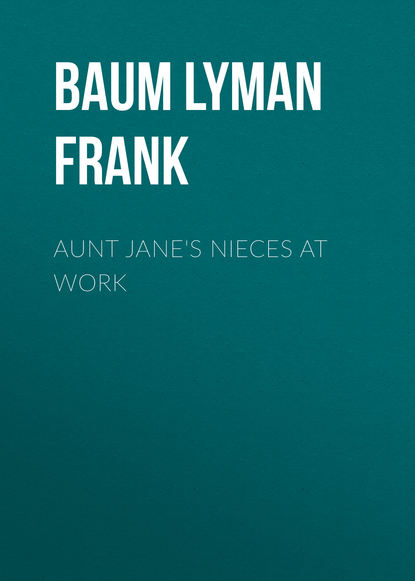По всем вопросам обращайтесь на: info@litportal.ru
(©) 2003-2024.
✖
Aunt Jane's Nieces at Work
Настройки чтения
Размер шрифта
Высота строк
Поля
"I know," said Beth, quickly. "It's Eliza Parsons. But Tom was mistaken. He saw her in the dim light of a corridor, and the resemblance confused him."
"I've seen her since," remarked Tom, "and the likeness is really bewildering. It's only her manner that is different."
"When I first saw her, before Tom came, I was astonished at her resemblance to Mrs. Rogers," announced Beth. "I have never seen Lucy, but I know Mrs. Rogers, and it seemed to me that Eliza was exactly like her in features. Mr. Forbes and I first saw her riding in a buggy with Mr. Hopkins. That was before either of us knew she was employed at Elmhurst. You see she isn't one of the servants who come much in contact with the family; she does the mending and takes charge of the linen room."
Beth then related the manner in which they first noticed Eliza, and how they had discovered her to be a spy in the service of Mr. Hopkins.
The detective was much interested in the recital and seemed surprised that he had not been informed of this before.
"Of course," said Kenneth, "the girl is not Lucy Rogers. It is not possible they could be the same."
"Why not?" asked Mr. Burke.
"Well, Lucy was a gentle, sweet country girl, of little experience in life. Her nature was so susceptible, so very sensitive, that when she discovered Tom Gates, whom she loved, to be guilty of a forgery, she worried herself into an attack of brain-fever; or at least she became insane, reproaching herself for having driven the boy to this dreadful deed. Under the influence of her mania she wandered away from her home, and has not been seen since. That's the story of Lucy Rogers. Now look at Eliza Parsons. She appeared the very day after Lucy's disappearance, to be sure; but that proves they are not the same person. For Eliza is not demented. She is a cold, hard woman of the world, in spite of her tender years. She is doing the work of an experienced spy, while any deceit was foreign to Lucy's nature. Instead of being plunged in grief Eliza is happy and gay, reckless of consequences and fully self-possessed. She is also well and healthy, to all appearances. Taking all these things into consideration, it is impossible to connect the two girls in any way – save the coincidence of personal resemblance."
Mr. Burke listened to this quietly, and then shook his head.
"Your arguments all tend to make me suspect that she is Lucy Rogers," he said, quietly.
For a moment there was an impressive silence, while everyone eagerly, inquiringly or doubtfully looked at the detective, according to their diverse acceptance of his statement.
"In pursuance of the task set me," began Mr. Burke, "I had met with such absolute failure to trace the missing girl that I began to suspect no ordinary conditions were attached to this case. In my experience, which covers many years, I have had occasion to study sudden dementia, caused by shocks of grief or horror, and I have come to comprehend the fact that the human mind, once unbalanced, is liable to accomplish many surprising feats. Usually the victim is absolutely transformed, and becomes the very opposite, in many ways, of the normal personality. I imagine this is what happened to Lucy Rogers."
"Do you imagine that Lucy would try to deceive me, sir?" asked Tom, reproachfully.
"I am sure she doesn't know who you are," answered the detective, positively. "She doesn't even know herself. I have known instances where every recollection of the past was wiped out of the patient's mind."
There was another thoughtful pause, for the detective's assertions were so astonishing that they fairly overwhelmed his hearers.
Then Louise asked:
"Is such a case of dementia hopeless, Mr. Burke?"
"Not at all hopeless. Often, I admit, it develops into permanent insanity, but there are many examples of complete recovery. Our first business must be to assure ourselves that we are right in this conjecture. I may be entirely wrong, for the unexpected is what I have been taught to look for in every case of mystery that has come under my observation. But I believe I have the material at hand to prove the personality of this Eliza Parsons, and after that I shall know what to do. Who employs your servants, Mr. Forbes?"
"Martha, my housekeeper, usually employs the maids."
"Will you send for her, please?"
Kenneth at once obeyed the request, and presently Martha entered the library.
She was a little, withered old woman, but with a pleasant face and shrewd but kindly eyes.
"Martha," said Kenneth, "did you employ the new linen maid, Eliza Parsons?"
"Yes, sir," she replied, apparently surprised at the question.
"This is Mr. Burke, Martha. Please answer any questions he may ask you."
"Yes, Master Kenneth."
"Did the girl bring any recommendations?" asked the detective.
Martha reflected.
"I do not think she did, sir."
"Are you accustomed to hiring maids without recommendations?" asked Mr. Burke.
"Oh, Eliza had a letter from my cousin, Mrs. Hopkins, who lives in Elmwood."
"Is Mrs. Hopkins your cousin?" asked Kenneth.
"Yes, sir. She were a Phibbs before she married Erastus, and my name is Phibbs."
"What did the letter from Mrs. Hopkins say?"
"It said she knew Eliza to be a clever and worthy girl, and if I had a place for her I couldn't do better than take her on. So I needed a linen maid and Eliza went right to work. Isn't she satisfactory, sir? Has she been doing anything wrong?"
"No. Please do not mention this interview to her at present, Miss Phibbs," said the detective. "That is all, I believe."
"Would you like to see Eliza?" asked Kenneth, when the housekeeper had retired.
"Not at present. I want to interview Mrs. Hopkins first."
"Tonight?" asked Tom, eagerly.
"I will go at once, with Mr. Forbes's permission."
"Certainly, sir," said Kenneth. "Shall we see you tomorrow?"
"Just as soon as I have accomplished anything."
"Would you like a horse or an automobile?"
"Your man may drive me to the town, sir, if it is convenient."
Kenneth gave the required order, and then Mr. Burke asked:
"How far are you prepared to go in this matter, sir?"
"In what way?"
"In expending money."
"Will any large expenditure be required?"
"I cannot say. But we may require the services and advice of an expert physician – a specialist in brain diseases."

















